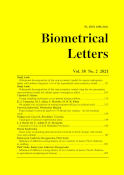
Biometrical Letters Vol. 58(2), 2021, pp. 105-117


Studies have been carried out on decomposing a model with symmetric structure using a model with asymmetric structure. In the existing decomposition theorem, the sum-symmetry model holds if and only if all of the two-parameters sum-symmetry, global symmetry and concordancediscordance models hold. However, this existing decomposition theorem does not satisfy the asymptotic equivalence for the test statistic, namely that the value of the likelihood ratio chi-squared statistic of the sumsymmetry model is asymptotically equivalent to the sum of those of the decomposed models. To address this issue, this study introduces a new decomposition theorem in which the sum-symmetry model holds if and only if all of the two-parameters sum-symmetry, global symmetry and weighted global-sum-symmetry models hold. The proposed decomposition theorem satisfies the asymptotic equivalence for the test statistic the value of the likelihood ratio chi-squared statistic of the sum-symmetry model is asymptotically equivalent to the sum of those of the two-parameters sumsymmetry, global symmetry and weighted global-sum-symmetry models.

asymptotic equivalence, asymmetry, orthogonality, symmetry, test statistic

